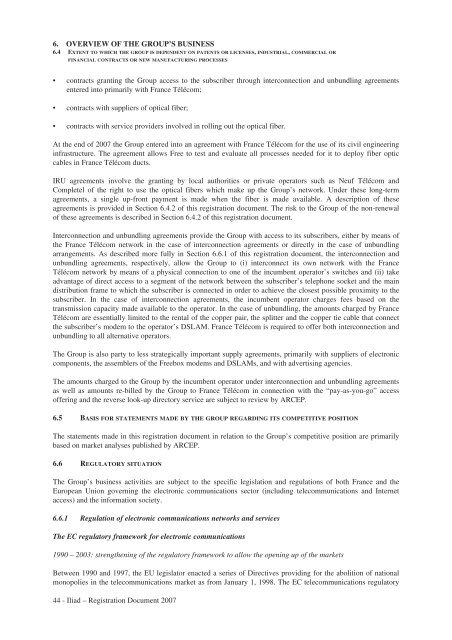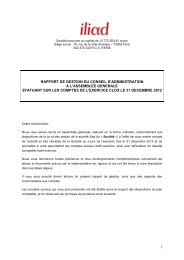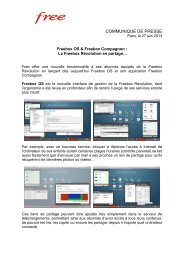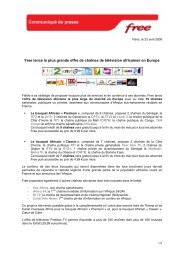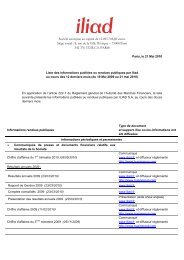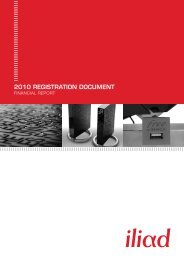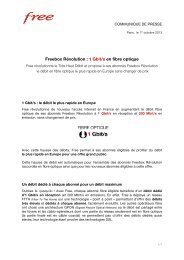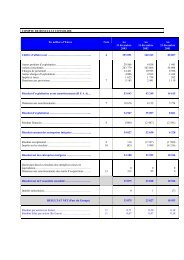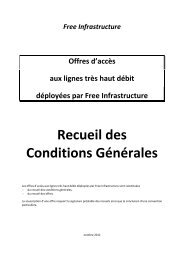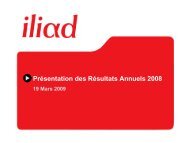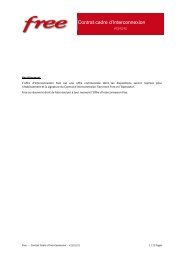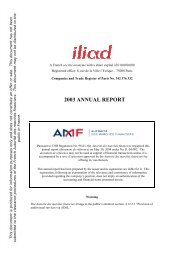REGISTRATION DOCUMENT AND FINANCIAL REPORT - Iliad
REGISTRATION DOCUMENT AND FINANCIAL REPORT - Iliad
REGISTRATION DOCUMENT AND FINANCIAL REPORT - Iliad
- TAGS
- registration
- iliad
- iliad.fr
You also want an ePaper? Increase the reach of your titles
YUMPU automatically turns print PDFs into web optimized ePapers that Google loves.
6. OVERVIEW OF THE GROUP’S BUSINESS<br />
6.4 EXTENT TO WHICH THE GROUP IS DEPENDENT ON PATENTS OR LICENSES, INDUSTRIAL, COMMERCIAL OR<br />
<strong>FINANCIAL</strong> CONTRACTS OR NEW MANUFACTURING PROCESSES<br />
• contracts granting the Group access to the subscriber through interconnection and unbundling agreements<br />
entered into primarily with France Télécom;<br />
• contracts with suppliers of optical fiber;<br />
• contracts with service providers involved in rolling out the optical fiber.<br />
At the end of 2007 the Group entered into an agreement with France Télécom for the use of its civil engineering<br />
infrastructure. The agreement allows Free to test and evaluate all processes needed for it to deploy fiber optic<br />
cables in France Télécom ducts.<br />
IRU agreements involve the granting by local authorities or private operators such as Neuf Télécom and<br />
Completel of the right to use the optical fibers which make up the Group’s network. Under these long-term<br />
agreements, a single up-front payment is made when the fiber is made available. A description of these<br />
agreements is provided in Section 6.4.2 of this registration document. The risk to the Group of the non-renewal<br />
of these agreements is described in Section 6.4.2 of this registration document.<br />
Interconnection and unbundling agreements provide the Group with access to its subscribers, either by means of<br />
the France Télécom network in the case of interconnection agreements or directly in the case of unbundling<br />
arrangements. As described more fully in Section 6.6.1 of this registration document, the interconnection and<br />
unbundling agreements, respectively, allow the Group to (i) interconnect its own network with the France<br />
Télécom network by means of a physical connection to one of the incumbent operator’s switches and (ii) take<br />
advantage of direct access to a segment of the network between the subscriber’s telephone socket and the main<br />
distribution frame to which the subscriber is connected in order to achieve the closest possible proximity to the<br />
subscriber. In the case of interconnection agreements, the incumbent operator charges fees based on the<br />
transmission capacity made available to the operator. In the case of unbundling, the amounts charged by France<br />
Télécom are essentially limited to the rental of the copper pair, the splitter and the copper tie cable that connect<br />
the subscriber’s modem to the operator’s DSLAM. France Télécom is required to offer both interconnection and<br />
unbundling to all alternative operators.<br />
The Group is also party to less strategically important supply agreements, primarily with suppliers of electronic<br />
components, the assemblers of the Freebox modems and DSLAMs, and with advertising agencies.<br />
The amounts charged to the Group by the incumbent operator under interconnection and unbundling agreements<br />
as well as amounts re-billed by the Group to France Télécom in connection with the “pay-as-you-go” access<br />
offering and the reverse look-up directory service are subject to review by ARCEP.<br />
6.5 BASIS FOR STATEMENTS MADE BY THE GROUP REGARDING ITS COMPETITIVE POSITION<br />
The statements made in this registration document in relation to the Group’s competitive position are primarily<br />
based on market analyses published by ARCEP.<br />
6.6 REGULATORY SITUATION<br />
The Group’s business activities are subject to the specific legislation and regulations of both France and the<br />
European Union governing the electronic communications sector (including telecommunications and Internet<br />
access) and the information society.<br />
6.6.1 Regulation of electronic communications networks and services<br />
The EC regulatory framework for electronic communications<br />
1990 – 2003: strengthening of the regulatory framework to allow the opening up of the markets<br />
Between 1990 and 1997, the EU legislator enacted a series of Directives providing for the abolition of national<br />
monopolies in the telecommunications market as from January 1, 1998. The EC telecommunications regulatory<br />
44 - <strong>Iliad</strong> – Registration Document 2007


